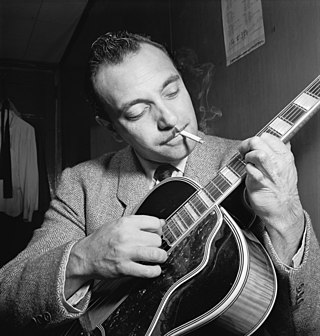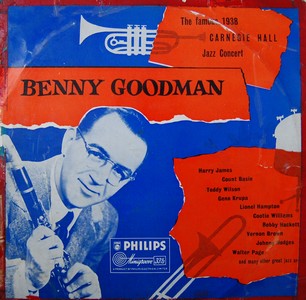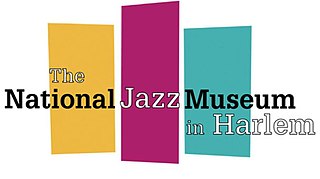Related Research Articles

Jean Reinhardt, known by his Romani nickname Django, was a Belgian-French Manouche or Sinti jazz guitarist and composer. Since he was born on Belgian soil, in Liberchies, he is also often named a Belgian musician. He was one of the first major jazz talents to emerge in Europe and has been hailed as one of its most significant exponents.

The Original Dixieland Jass Band (ODJB) was a Dixieland jazz band that made the first jazz recordings in early 1917. Their "Livery Stable Blues" became the first jazz record ever issued. The group composed and recorded many jazz standards, the most famous being "Tiger Rag". In late 1917, the spelling of the band's name was changed to Original Dixieland Jazz Band.

Benjamin David Goodman was an American clarinetist and bandleader, known as the "King of Swing". His orchestra did phenomenally well commercially.

William James "Count" Basie was an American jazz pianist, organist, bandleader, and composer. In 1935, he formed the Count Basie Orchestra, and in 1936 took them to Chicago for a long engagement and their first recording. He led the group for almost 50 years, creating innovations like the use of two "split" tenor saxophones, emphasizing the rhythm section, riffing with a big band, using arrangers to broaden their sound, his minimalist piano style, and others.

Lionel Leo Hampton was an American jazz vibraphonist, percussionist, and bandleader. He worked with jazz musicians from Teddy Wilson, Benny Goodman, and Buddy Rich, to Charlie Parker, Charles Mingus, and Quincy Jones. In 1992, he was inducted into the Alabama Jazz Hall of Fame, and he was awarded the National Medal of Arts in 1996.
Swing music is a style of jazz that developed in the United States during the late 1920s and early 1930s. It became nationally popular from the mid-1930s. Swing bands usually featured soloists who would improvise on the melody over the arrangement. The danceable swing style of big bands and bandleaders such as Benny Goodman was the dominant form of American popular music from 1935 to 1946, known as the swing era, when people were dancing the Lindy Hop. The verb "to swing" is also used as a term of praise for playing that has a strong groove or drive. Musicians of the swing era include Duke Ellington, Benny Goodman, Count Basie, Cab Calloway, Benny Carter, Jimmy Dorsey, Tommy Dorsey, Woody Herman, Earl Hines, Bunny Berigan, Harry James, Lionel Hampton, Glenn Miller, Artie Shaw, Jimmie Lunceford, and Django Reinhardt.

Dinah Washington was an American singer and pianist, one of the most popular black female recording artists of the 1950s. Primarily a jazz vocalist, she performed and recorded in a wide variety of styles including blues, R&B, and traditional pop music, and gave herself the title of "Queen of the Blues". She was also known as "Queen of the Jukeboxes". She was a 1986 inductee of the Alabama Jazz Hall of Fame, and was inducted into the Rock and Roll Hall of Fame in 1993.

Gunther Alexander Schuller was an American composer, conductor, horn player, author, historian, educator, publisher, and jazz musician.

Hezekiah Leroy Gordon Smith, better known as Stuff Smith, was an American jazz violinist. He is well known for the song "If You're a Viper".

Downing Stadium, previously known as Triborough Stadium and Randall's Island Stadium, was a 22,000-seat stadium on Randalls Island in New York City. It was renamed Downing Stadium in 1955 after John J. Downing, a director at the New York City Department of Parks and Recreation. It was demolished in 2002 and the current Icahn Stadium was built on the site.

It's All True is an unfinished Orson Welles feature film comprising three stories about Latin America. "My Friend Bonito" was supervised by Welles and directed by Norman Foster in Mexico in 1941. "Carnaval" and "Jangadeiros" were directed by Welles in Brazil in 1942. It was to have been Welles's third film for RKO Radio Pictures, after Citizen Kane (1941) and The Magnificent Ambersons (1942). The project was a co-production of RKO and the Office of the Coordinator of Inter-American Affairs that was later terminated by RKO.

Randolph Edward "Randy" Weston was an American jazz pianist and composer whose creativity was inspired by his ancestral African connection.

Philip van Noorden Schaap was an American radio host, who specialized in jazz as a broadcaster, historian, archivist, and producer. He hosted an assortment of jazz programs at WKCR and WNYC in New York City and WBGO in Newark, N.J. He began presenting jazz shows on Columbia University's WKCR in 1970, and hosted Bird Flight and Traditions In Swing on WKCR for 40 years, shows which are broadcast in archival versions to this day, beginning in 1981. He received six Grammy Awards over the course of his career.

The Winter Music Conference (WMC) is a week-long electronic music conference, held every March in Miami Beach, Florida, United States since 1985. It is also known as the premiere platform for electronic dance music. The conference brings together professionals such as artists, DJs, record label representatives (A&R), producers, promoters, radio and the media for seminars and panel discussions. Each year, the WMC draws thousands of attendees from around the world.
The Squadronaires is a Royal Air Force band which began and performed in Britain during and after World War II. The official title of the band was 'The Royal Air Force Dance Orchestra', but it was always known by the more popular title "The Squadronaires".

Maxine Sullivan, born Marietta Williams in Homestead, Pennsylvania, United States, was an American jazz vocalist and performer.
The Hot Club de France is a French organization of jazz fans dedicated to the promotion of "traditional" jazz, swing, and blues. It was founded in 1931 in Paris, France, by five students of the Lycée Carnot. In 1928, Jacques Bureaux, Hugues Panassié, Charles Delaunay, Jacques Auxenfans, and Elvin Dirat came together to listen to jazz and, later, promote its acceptance in France. The point was to make the public aware of jazz and to defend and promote the style in the face of all opposition. The club began in the fall of 1931 as the Jazz Club Universitaire, as the members were all still students. It was reborn and reimagined in 1932 as the Hot Club de France.

The Famous 1938 Carnegie Hall Jazz Concert by Benny Goodman, Columbia Records catalogue item SL-160, is a two-disc LP of swing and jazz music recorded at Carnegie Hall in New York City on January 16, 1938. First issued in 1950, the landmark recording captured the premiere performance given by a big band in the famed concert venue. The event has been described as "the single most important jazz or popular music concert in history: jazz's 'coming out' party to the world of 'respectable' music."
Festivals in Aruba take place throughout the year on the island. The island waived COVID-19 testing requirements in 2022 to increase the number of visitors.

The National Jazz Museum in Harlem is dedicated to preservation and celebration of the jazz history, culture and music of Harlem, Manhattan, New York City. The museum was founded in 1997 by Leonard Garment, then Counsel to two U.S. presidents and an accomplished jazz saxophonist, Abraham David Sofaer, former U.S. district judge who gave the initial gift in honor of his brother-in-law Richard J. Scheuer, Jr., and matching funds from the Upper Manhattan Empowerment Zone, Harlem Community Development Corporation. For more than 15 years, the museum was in East Harlem at 104 East 126th Street.
References
- 1 2 Rohter, Larry (2010-08-16). "Museum Acquires Storied Trove of Performances by Jazz Greats". New York Times.
- ↑ Historic music find 'redefines' swing era jazz, BBC News, 29 Sept 2010
- ↑ 1938 Randall's Island Carnival of Swing - 70th anniversary Archived 2011-07-17 at the Wayback Machine , yehoodi.com, accessed 30 Sept 2010